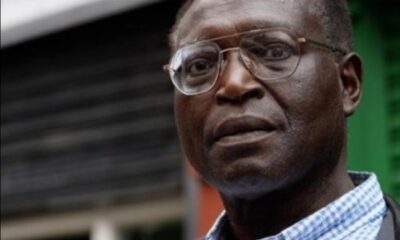News
Tough Economy: Schools Now Accept Payments In Esusu Style
Published
7 months agoon
By
Editor
The time many schools grandstand that no student is allowed to stay in class without having paid their fees fully is over.
Such schools, particularly those located in areas populated by low-income earners, will fold up immediately.
The present economy does not support such hard-stances school administration anymore. And, most schools that actually understand the environment they are operating in, have improvised accordingly.
Like we say in local parlance, the situation Nigerians find themselves now, warrants that everybody must borrow sense.
Some sharp schools have just done that. They have introduced the Esusu method of paying school fees, Vanguard reports.
It sounds funny, but they are getting by, pretty well with it.
Esusu is a local Nigerian word for thrift.
READ ALSO: Wike Orders Demolition Of Popular Abuja Market
It is a system where particularly, low-income earners, market women and artisans pool together their meagre resources for a period of time and draw it when it must have accumulated, to be able to carry out a project or solve a problem.
That is the method some schools have adopted to help parents cope with fees payment in an economy where average income earners are living from hand to mouth.
Some parents who spoke to Economy&Lifestyle painted pathetic pictures of what they go through to see their wards through schools, and a few schools they approached seemed to understand.
Mrs. Met Omosefunmi, a private school teacher, said: “Some schools accept school fees daily.
“As the child is coming to school, and the parents know they cannot afford termly payment of school fees.
“In a school I served in Muwo, when the management saw the predicaments of parents due to what the economy had become. They introduced the Esusu style of collecting school fees.
“They made small cards with months and days available to parents.
READ ALSO: How Gunmen Attacked Yahaya Bello – Kogi Govt
“The wards come to school with the cards and their amount they are paying for the day and it is ticked to show parents.
“The children are given the cards when going home to avoid misplacing them.
“If such a means is not adopted parents will move their wards to other schools, you know things are very difficult and they cannot really afford paying the fees so they take such a child to a public school.
“There is also a new school in my area that is runned like a public school. The fees are very low. As low as N3500 per term for a child in primary level and N5,000 for the Secondary level. The population is very large and their branches as well.
“They also use the esusu method.”
However not all that is good for the goose is good for the gander.
A parent without an up to date Tax Clearance certificate might not be able to register the child or children in public schools in some states as part of the school requirements.
Mrs Ogbonna Victoria, a senior secondary school teacher said: “The rate at which parents are withdrawing their children because of increased school fees is alarming.
“Most of them take the children to public schools where they pay no school fees but register with basic requirements like tax clearance certificates among other things.
“If a parent can afford the school fees, but can meet up with payment only thrice he informs the school management.
READ ALSO: Reactions As Nigerian Gospel Artiste Arrives Stage In Casket [PHOTOS]
“My son’s school for instance after losing over 15 pupils, the management had to reconsider esusu after a parent introduced it in one of the Parents Teacher Association meetings.
“The high cost of living is making everyone cut costs, including in areas of education.
“Gone are the days when parents sought good and expensive schools for their wards.
“Now, the children should just leave home to study.
“It doesn’t matter whether it is a private or public school.”
Mrs. Amanda Lawrence, a hair stylist, said she had to change the school of her two-year-old daughter after the fees was raised ti N50,000 per term from N35,000 and the management insisted on termly payment.
READ ALSO: Weeks After Divorce, Actor Bolanle Ninalowo Reveals He’s ‘In Love’ Again
“The way things are heading in this economy is alarming.
“When I attended school, I was paying N5,000 per term in primary school. Now our education system has degraded and the schools are still increasing school fees.
“My sister had to take her children to a government secondary school in Surulere, when their school fees were increased to N60,000 per term from N45,000 and the school refused the Esusu method.
“This term I changed the school of my two year old daughter when her old school increased her school fees to N50,000 per term from N35,000 and refused the Esusu method.
“In her new school you can pay four to five times or weekly like esusu in a term but you will sign a legal agreement on such terms.
“This is what many schools are doing now to ease the burden of debt and avoid less patronage in the case of insisting on full payment at once .
On her part, Mrs. Grace Ohaleke, a public school teacher said: “My children are in public schools today because I had to convince my husband to withdraw them from their former school that was a private school because they refused the Esusu method of fees payment without considering the amount of children I had.
“Many schools are coming up with school fee payment methods to keep and increase their students.
“The esusu is the most adopted style which also enables them to pay teachers on time too.
“My son was in Junior Secondary School three (JSS3) then.
“I told him I cannot pay ridiculous fees to a school that doesn’t even have quality teachers.
“In public schools, you can never see a teacher that is not qualified in teaching.
“We have the best and no one can deny that.
“My son was first ashamed when they started but as time went by he got used to it and is happy.
“Parents in this present economy, no longer look at what people will say or do for their actions.
“They go for what will give them peace of mind and enable them to save for other expenses.”
VANGUARD
You may like


50-year-old Man Dies While Watching Football Match In Lagos Bar


JUST IN: Truck Rams Into BRT On Lagos-Ibadan Expressway


Lagos Hotel Showcases ‘Most Advanced Room In West Africa’ That Costs Over N1m Per Night


Sanwo-Olu’s Deputy Chief Of Staff Is Dead


See Lagos Environment Commissioner’s Funny Reply To Resident’s Complaint About Neighbours Moaning Loudly At Night


Truck Crushes Five-year-old Girl In Lagos
News
Shettima Launches NEDC’s School Enrollment Drive Programme
Published
35 mins agoon
May 18, 2024By
Editor
Vice President Kashim Shettima has launched the Accelerated Senior Secondary School Education Programme (ASSEP) initiated by the North-East Development Commission (NEDC) in collaboration with the office of the VP to enhance child enrollment drive in schools within the North-East sub-region.
Speaking during the launching of the programme in Bauchi on Saturday, the VP said that consequences of the nation’s action and inaction were evident in all indices used to assess development.
He said while primary education provides a foundation, secondary education is a bridge, adding that the Northeast sub-region has been the victim of inability to enforce a uniform policy to drive school and the persistent cultural perversion to formal education in the country.
READ ALSO: Excitement, Dance As ‘Looted Ancestral Stools’ Return To Oba Of Benin
“We in the Northeast occupy a quantum of position in ranking of essential services. Education being a key sector of this country, this is especially pronounced in the post primary education, while the Northeast secondary school enrollment drive stands at 19 percent, far below the nation’s 39 percent,” he said.
Earlier, the Managing Director of NEDC, Mohammed Alkali, said that the primary education completion level of 85 per cent in the Northeast is among the best in Nigeria, but secondary school enrolment is a mere 15 per cent, the second worst nationally.
According to him, due to the challenges in the post-primary education segment, JAMB UTME applications and admissions into tertiary institutions in 2019 were the lowest for the Northeast compared to other regions.
READ ALSO: Three Children Rescued As Fire Guts Storey Building In Delta
He added that, nationally, the Northeast has the lowest number of teachers and the highest percentage 55 per cent of those available are without literacy skills.
The MD also revealed that the challenges in the post-primary education segment include weak quality indices and a wide demand-supply gap driven by economic and cultural factors.
“The Accelerated Senior Secondary Education Programme seeks to boost the post primary education rating across the North East region through improved enrolment into tertiary institutions.
“It’s also to improve skills development as well as the elevation of teacher quality. It would pay special focus on Science, Technology, Engineering, Mathematics and communication.
READ ALSO: JUST IN: Tinubu Appoints Governing Board Members For 111 Tertiary Institutions
“These would foster creativity and critical thinking; motivates and inspires young people to generate new technologies and ideas to learn from inquiry-based tasks,” he said.
Alkali also explained that the programme would also raise awareness about after-school possibilities and the potential for diligent students to become successful and prominent contributors to the North East region and Nigeria at large.
He expressed gratitude to the Federal Government especially, the Vice President for the deep interest and commitment to human development in the North-East.
News
Edo Police Break Silence On Operatives Fighting Dirty In Viral Video
Published
1 hour agoon
May 18, 2024By
Editor
By Joseph Ebi Kanjo
The Edo State Police Command says a trending video showing two operatives of the command engaging in a fight is a handiwork of mischief makers.
In the video which has gone viral on the internet, two policemen are seen fighting themselves, while a voice commentary in the background claims they are from the Igueben Decisional Police Station headquarters in the state.
A writeup also attached to a version of the video sighted by Info Daily also claims that the policemen were fighting because of sharing formula of money collected from motorists on the highway. The writeup also claims that the incident happened yesterday, May 17th, 2024.
READ ALSO: Three Children Rescued As Fire Guts Storey Building In Delta
But reacting to the viral video in a statement issued by SP Chidi Nwabuzor, Police Public Relations Officer, the command said contrary to the claim, the incident happened in 2020, adding that disciplinary measures were taken against the erring policemen.
The statement which issued electronically to newsmen in Benin on Saturday evening partly reads: “Edo State Police Command wishes to inform the general public that it’s aware of a video trending on the internet showing two policemen that engaged themselves in a fight in public spaces and wishes to state as follows that;
“The now trending video happened in April 2020 in a community called Ebelle in the Igueben local government area of Edo State.
READ ALSO: JUST IN: Tinubu Appoints Governing Board Members For 111 Tertiary Institutions
“The two erring policemen, namely; (i) F/NO.491112 CPL Ozimeade Aidonojie and (ii) F/NO. 516384 PC Salubi Stephen were attached to Ebelle Police Divisional Headquarters.
“They defaulted, tried in an orderly and upon conviction dismissed from the Force for the offence of discreditable conduct contrary to Paragraph ‘E’ Sub Section 111 of the Police Act and Regulations 370 Cap. P19 of Federation of Nigeria 2004.”
Nwabuzor in the statement reiterated the state Commissioner of Police, Funsho Adegboye, commitment to “making Edo State a desired secured state where the law abiding citizens and the general public go about their lawful businesses in making Edo State economic hubs of Nigeria without fear or intimidation.”
News
Excitement, Dance As ‘Looted Ancestral Stools’ Return To Oba Of Benin
Published
2 hours agoon
May 18, 2024By
Editor
It was a moment of joy, excitement and dance at the palace of the Oba of Benin as the revered monarch, Oba Ewuare II took custody of two looted royal stools from the German government.
They were handed over to the National Commission for Museums and Monuments, NCMM on behalf of the Nigerian government by the German authorities in 2022.
The Director-General of
National Commission for Museums and Monuments, Mr Olugbile Holloway made the presentation on behalf of the Federal Government on Saturday May18, 2024 in Oba of Benin Palace, Benin City.
According to history, the artefacts — Bronze and wooden Royal stools (Ekete), made during the reign of Oba Eresoyen and Oba Esigie several Centuries ago, were looted from Oba Palace during the punitive expedition in 1897.
READ ALSO: Over 100 Priests, Palace Chiefs Storm Court For Oba Of Benin In Solidarity
Addressing the Benin Throne during the presentation of the artefacts, Mr Holloway, pledged on behalf of NCMM, to work-hand-in hand with the Benin Royal Court in uplifting and displaying Edo heritage.
He revealed that as the Benin Bronzes and other art works are gradually making their way home (Nigeria), “NCMM will join hands with the Royal Court to create a befitting destination for people around the world to come and appreciate these works”.
“What you see before us were originally taken away from the Royal family in 1897.
“We have a stool made of Bronze and a wooden stool.
“I speak for every member of my team, to say that we remain loyal to the Royal Court. And if there is anything we can do, we will do to support this laudable initiative.
READ ALSO: Oba Of Benin Suspends Six Officials For Posing As Palace Emissaries To Ooni Of Ife
“This heritage is not just Benin heritage, but Nigeria’s heritage.
When we speak of Benin heritage, there is nobody that doesn’t know the great works of ours.
“I appreciate you, we will always do what we can do with our powers to make His Royal Majesty lineage in memory”, he said.
After unveiling the repatriated Artefacts, Oba of Benin, who danced joyfully to Benin traditional rendition in dramatic dance steps, with excited Chiefs and members of the Royal family, offered prayers to Almighty God and his ancestors.
The traditional ruler, who was visibly overwhelmed with joy, appreciated the German government and the Federal Government and the NCMM leadership for their efforts.
The royal father, thereafter, in a historic move, sat in one of the royal stools (Ekete), and personally presented a chunk of white, which, according to belief, symbolizes peace and blessings to the Director-General of National Commission for Museums and Monuments, Mr Olugbile Holloway.
Oba Ewuare II also prayed for Mr Holloway and his team, accompanied by the Curator, National Museum, Benin, Mr Mark Olaitan, Director, Legal Services, NCMM, Barrister Babatunde Adebiyi on the visit where Royal Drummers gave a good account of their stewardship.

Shettima Launches NEDC’s School Enrollment Drive Programme

Edo Police Break Silence On Operatives Fighting Dirty In Viral Video

Excitement, Dance As ‘Looted Ancestral Stools’ Return To Oba Of Benin
Trending

 Headline5 days ago
Headline5 days agoLady Arrested For Allegedly Harassing, Cyberstalking Crown Prince Of Benin Kingdom [VIDEO]

 Entertainment4 days ago
Entertainment4 days agoVIDEO: Drama As Portable Jumps Gate To Evade Police Arrest

 News5 days ago
News5 days agoEdo Govt Takes Custody Of 4-year-old Girl Used For Adult Content

 Headline5 days ago
Headline5 days ago32-year-old Nigerian Doctor Killed In US, Father Mourns

 News4 days ago
News4 days agoMan Arrested For Invading Plateau Bank With Bomb

 Headline5 days ago
Headline5 days ago‘You’re Guilty’ – Judge Roars, Jailed UK-based Nigerian Pastor, Wife 34 Years For Raping, Assaulting Members

 Headline4 days ago
Headline4 days agoPolice Give Tips On How To Report Erring Officers

 Metro5 days ago
Metro5 days agoThree Suspects Connected To Series Of Kidnappings In Delta Arrested

 News4 days ago
News4 days agoSee Lagos Environment Commissioner’s Funny Reply To Resident’s Complaint About Neighbours Moaning Loudly At Night

 News2 days ago
News2 days agoUK Denies 74-year-old Mam Permanent Residency After 42 Years Stay


































